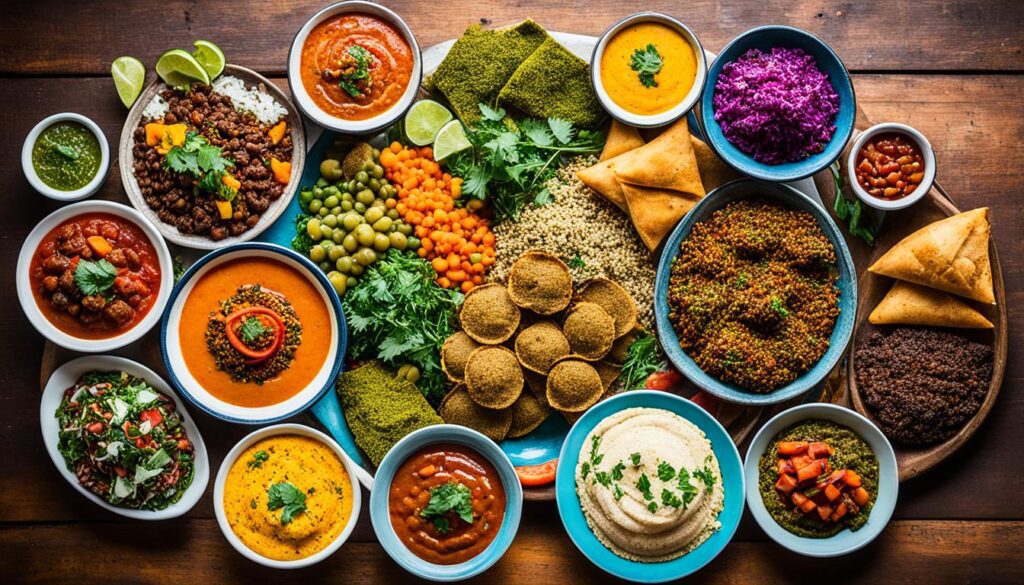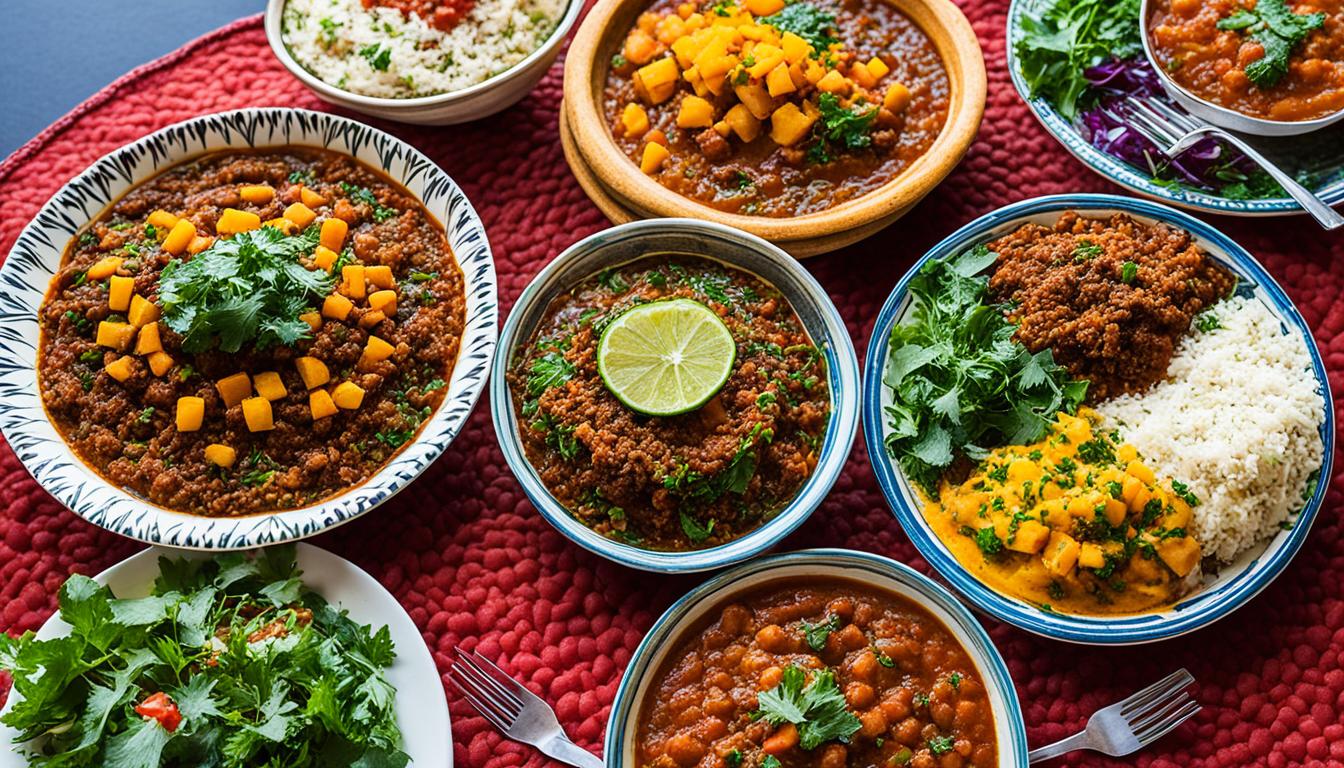Is Ethiopian Food Vegan?
When it comes to exploring diverse cuisines, Ethiopian food stands out for its enticing flavors and unique combination of spices. But does Ethiopian cuisine cater to the needs of vegans? Are there enough plant-based options to satisfy the appetite of those following a vegan diet?
In this article, we will delve into the world of Ethiopian cuisine to uncover the truth behind its vegan-friendly nature. From staple dishes to ethical practices, we’ll explore the reasons why Ethiopian food has become a favorite among vegans around the world.
So, if you’re curious to know if Ethiopian food is truly vegan, or if you’re a seasoned vegan searching for new culinary adventures, join us on this journey as we unravel the secrets of Ethiopian cuisine.
Key Takeaways:
- Ethiopian food offers a variety of vegan-friendly options that cater to plant-based diets.
- Traditional Ethiopian cooking techniques and a wide selection of vegetable-based dishes contribute to the vegan-friendliness of Ethiopian cuisine.
- Injera, a tangy fermented flatbread, is a staple in Ethiopian cuisine and is often enjoyed with lentil and vegetable wats (stews).
- Ethiopian cuisine also offers vegan modifications to non-vegan dishes, allowing for a customized dining experience.
- Exploring Ethiopian food provides an opportunity to support ethical and sustainable practices, such as local agriculture and reducing food waste.
Introduction to Ethiopian Cuisine
Before we dive into the vegan aspect, let’s take a moment to explore the fascinating world of Ethiopian cuisine. Renowned for its unique flavors, vibrant colors, and rich cultural heritage, Ethiopian food offers a culinary experience like no other.
At the heart of Ethiopian cuisine is a diverse range of dishes that reflect the country’s geographical and historical influences. From the highlands of the north to the savannahs of the south, each region brings its own distinct flavors and ingredients to the table.
One of the defining characteristics of Ethiopian cuisine is its masterful use of spices. Aromatic blends like berbere, a fiery mix of chili peppers, garlic, and various herbs, create an explosion of flavors that tantalize the taste buds.
Communal Dining Traditions
In addition to its culinary delights, Ethiopian cuisine also embraces a unique tradition of communal dining. Known as gursha, this practice involves sharing food from a communal platter, typically served on injera, a spongy fermented flatbread.
This communal dining experience fosters a sense of togetherness and unity, encouraging diners to engage in lively conversations and connect on a deeper level.
So, whether you’re a seasoned foodie or new to Ethiopian cuisine, get ready to embark on a gastronomic journey filled with bold flavors, aromatic spices, and rich cultural traditions.
The Vegan-Friendly Nature of Ethiopian Food
When it comes to vegan-friendly cuisines, Ethiopian food is undoubtedly a top contender. Ethiopian cuisine offers a plethora of delicious dishes that are not only rich in flavor but also cater to the dietary needs of vegans. This culinary tradition stands out for its extensive selection of vegetable-based dishes and the ingenious use of traditional cooking techniques.
One of the key reasons why Ethiopian food is so vegan-friendly lies in its emphasis on plant-based ingredients. Vegetables, legumes, and grains take center stage in Ethiopian cuisine, with spices and seasonings adding depth and complexity to the dishes. This focus on plant-based ingredients makes it easier for vegans to find a wide variety of options when dining out or cooking Ethiopian food at home.
Traditional Cooking Techniques
Another factor that contributes to the vegan-friendly nature of Ethiopian food is the country’s unique cooking techniques. Injera, a sourdough flatbread, is a staple in Ethiopian cuisine and serves as the foundation for many meals. Made from fermented teff flour, injera has a tangy taste and a spongy texture. It is often used as both a utensil and a component of the dish, allowing diners to scoop up various vegan stews and curries.
Furthermore, Ethiopian cuisine employs slow-cooking methods that extract maximum flavor from the ingredients. This includes simmering vegetables, lentils, and legumes with aromatic spices and herbs for hours, resulting in hearty and flavorful vegan dishes. The slow-cooking process also contributes to the tenderness of the vegetables and the development of rich, robust flavors.
To truly grasp the vegan-friendly nature of Ethiopian food, one must experience the vibrant flavors and diverse array of vegetable-based dishes firsthand. So, whether you’re a vegan searching for new and exciting flavors or someone looking to add more plant-based options to your diet, Ethiopian cuisine offers a delightful culinary adventure.

Staple Vegan Dishes in Ethiopian Cuisine
When it comes to vegan dishes, Ethiopian cuisine offers a delightful array of options that will please even the most discerning palate. These dishes showcase the vibrant flavors and unique cooking techniques that define Ethiopian food. Let’s dive into some of the staple vegan dishes you can savor in Ethiopian cuisine.
Injera: A Tangy Fermented Flatbread
One of the most iconic and versatile components of Ethiopian cuisine is injera. This tangy fermented flatbread, made from teff flour, is not only vegan but also gluten-free. Injera serves as both a staple and a utensil in Ethiopian dining, playing a crucial role in the communal meal experience. Its spongy texture and slightly sour taste perfectly complement the rich flavors of Ethiopian stews and dishes.
Lentil and Vegetable Wats: Flavorful Stews
Ethiopian cuisine is renowned for its wats, a variety of flavorful stews made with lentils, vegetables, and aromatic spices. These wats are often the highlight of Ethiopian vegan cuisine. Spiced with berbere, a blend of chili peppers, herbs, and spices, these stews tantalize the taste buds and showcase the complexity of Ethiopian flavors. Whether it’s red lentil wat (Misir Wat) or spiced cabbage and carrot wat (Tikil Gomen Wat), these vegan stews offer a hearty and satisfying dining experience.
In addition to injera and wats, Ethiopian cuisine also boasts other plant-based dishes like shiro, a thick chickpea stew, and gomen, a spinach-based dish. These dishes, combined with the unique flavors of Ethiopian spices, create a vegan culinary adventure that celebrates the diversity and richness of Ethiopian cuisine.
Next, we’ll explore how non-vegan Ethiopian dishes can be modified to accommodate a plant-based diet, allowing you to enjoy the best of both worlds.
Vegan Additions to Non-Vegan Dishes
Ethiopian cuisine is renowned for its bold flavors and diverse array of dishes, many of which traditionally include animal-based ingredients. However, for those following a plant-based diet, there are still plenty of options available. In fact, Ethiopian food offers creative ways to modify non-vegan dishes by incorporating vegan additions.
One popular example is the use of vegan protein substitutes in meat-based stews. Instead of traditional meat options like beef or chicken, plant-based alternatives such as tofu, tempeh, or seitan can be used to create a similar texture and rich flavor. These vegan additions provide a satisfying protein source while maintaining the essence of the dish.
Additionally, Ethiopian cuisine often features a variety of spices and herbs that enhance the taste of the dishes. Vegan additions can be made by incorporating flavorful vegetables like mushrooms, eggplants, or jackfruit to complement the spices and create a hearty and satisfying meal.

The image above showcases a colorful and vibrant plate of vegan Ethiopian food, highlighting the incorporation of diverse plant-based ingredients and spices.
Ethical and Sustainable Aspects of Ethiopian Food
When it comes to Ethiopian food, its ethical and sustainable aspects go beyond being vegan-friendly. The cuisine actively supports local agriculture and promotes the reduction of food waste, making it a conscious and responsible choice for food enthusiasts.
Ethiopian cuisine is deeply rooted in the country’s agricultural practices. Ingredients like injera, lentils, and vegetables are sourced locally, ensuring that farmers and producers are supported. By prioritizing local agriculture, Ethiopian food helps sustain the livelihoods of small-scale farmers and contributes to the overall economic development of the region.
Moreover, Ethiopian food promotes the reduction of food waste through its traditional cooking techniques. Many dishes are prepared using various parts of vegetables and grains, ensuring that no edible parts are wasted. This focus on utilizing ingredients to their fullest potential reduces the environmental impact of food production and helps combat food scarcity.
By embracing Ethiopian cuisine, you not only savor the delicious flavors and unique combinations but also contribute to ethical and sustainable practices. Join us in exploring the vibrant world of Ethiopian food and its positive impact on local communities and the environment.
Exploring Local Agriculture
Ethiopian food’s commitment to supporting local agriculture goes beyond taste. By sourcing ingredients locally, the cuisine fosters a symbiotic relationship between farmers, producers, and consumers. It ensures that farmers receive fair compensation for their hard work and facilitates the growth of sustainable agriculture practices in the region.
Reducing Food Waste through Traditional Techniques
Traditional Ethiopian cooking techniques showcase resourcefulness and ingenuity when it comes to utilizing ingredients fully. The cuisine’s focus on creating flavorful dishes from various parts of vegetables and grains minimizes food waste. This not only benefits the environment but also aligns with the global effort to combat food scarcity and promote responsible consumption.
Conclusion
In conclusion, Ethiopian food offers a wide range of delectable vegan-friendly options that are sure to satisfy those following a plant-based diet. With its vibrant flavors, rich spices, and unique communal dining traditions, Ethiopian cuisine provides an exciting culinary experience for all.
From the tangy and fermented injera, a staple flatbread, to the flavorful lentil and vegetable wats (stews), Ethiopian cuisine showcases the diversity and creativity of plant-based ingredients. These dishes not only contribute to a balanced vegan diet but also celebrate the cultural significance of Ethiopian food.
Beyond its vegan-friendly nature, Ethiopian food also demonstrates a commitment to ethical and sustainable practices. By supporting local agriculture and minimizing food waste, Ethiopian cuisine fosters a connection with the environment and aligns with the values of conscious food choices.






